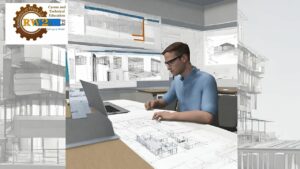
The implementation of Building Information Modeling (BIM) within architectural firms has transformed the way projects are designed and executed.
While technical expertise is crucial in this process, the role of soft skills should not be overlooked. In fact, soft skills such as communication, teamwork, and adaptability are essential for the successful integration of BIM.
In this blog post, we will explore the importance of soft skills in the world of BIM and how they can make a significant difference in job skills and overall project success. As a leading provider of BIM services, RW2 understands the value of both technical and soft skills in this field.
So, let’s delve into the journey of enhancing interpersonal skills and understanding users’ perspectives, and how it can lead to successful BIM implementation.
Understanding Building Information Modeling (BIM)
Building Information Modeling (BIM) represents a paradigm shift in the architecture, engineering, and construction (AEC) industries.
It is a digital representation of the physical and functional characteristics of a facility. Unlike traditional design methods that rely heavily on two-dimensional drawings, BIM encompasses three-dimensional models enriched with data regarding materials, cost estimates, scheduling, and more.
This advanced approach enables stakeholders to visualize the project in a simulated environment, allowing for better decision-making throughout the construction lifecycle. BIM is not just about using sophisticated software; it requires a deep understanding of the project’s complexities and collaborative efforts across various disciplines.
By leveraging BIM, teams can work more cohesively, identifying potential issues early and optimizing solutions, which ultimately leads to improved efficiency and cost-effectiveness in project delivery.
The essence of BIM goes beyond mere technology adoption; it represents a shift towards a more integrated and collaborative approach to project management and execution, demanding a harmonious blend of technical acumen and soft skills.
The Vital Role of Communication in BIM Implementation
In the realm of Building Information Modeling (BIM), communication emerges as a cornerstone for successful project execution. The complexity and interdisciplinary nature of BIM projects necessitate clear, concise, and effective communication among all stakeholders.
From architects and engineers to contractors and clients, the ability to convey ideas, express concerns, and share feedback is paramount. This ensures that all parties are aligned with the project objectives, timelines, and expectations.
In the context of BIM, communication is not just about exchanging information; it’s about fostering a collaborative environment where multidisciplinary teams can work together seamlessly. Miscommunications or a lack of clarity can lead to delays, errors, and, ultimately, increased costs.
Thus, developing strong communication skills is not just beneficial but essential for professionals navigating the BIM landscape. It allows for the effective coordination of complex tasks, enhances problem-solving capabilities, and contributes to the creation of a more integrated and cohesive project outcome.
In essence, while BIM technology facilitates better project visualization and management, it is the human element of communication that binds the process together, driving projects to their successful completion.
The Interplay between Technical Skills and Soft Skills in BIM
In the realm of Building Information Modeling (BIM), the fusion of technical skills and soft skills forms the backbone of project success.
Technical skills in BIM encompass proficiency in software applications, understanding of construction principles, and the ability to manage and analyze data effectively. These skills enable professionals to create detailed models that serve as a digital twin of the physical project, encompassing all necessary information for construction and facility management.
However, technical prowess alone does not guarantee the seamless execution of projects. This is where soft skills come into play, acting as the glue that binds the technical aspects with the human elements of project execution.
Communication stands out as a critical soft skill, facilitating clear and efficient exchanges between architects, engineers, contractors, and clients. It ensures that everyone is on the same page, minimizing errors and misunderstandings that can lead to costly delays. Teamwork and adaptability are equally important, as BIM projects often involve a multidisciplinary team working towards a common goal. These skills allow for a collaborative environment where ideas and solutions can flow freely, fostering innovation and problem-solving.
Moreover, empathy and leadership are vital in navigating the complexities of BIM implementation. Understanding the perspectives and challenges of each team member can lead to more effective management strategies, enhancing the overall workflow and project outcomes.
Thus, the interplay between technical skills and soft skills in BIM is not merely complementary but symbiotic. Each set of skills enhances the other, creating a holistic approach to project management that leverages the full spectrum of professional capabilities. By recognizing and cultivating both areas of expertise, professionals in the AEC industry can achieve a higher level of proficiency and success in their BIM projects.
How RW2 Equips You with the Necessary Skills for BIM
At RW2, we recognize the dual importance of technical prowess and soft skills in the realm of Building Information Modeling (BIM). Our comprehensive training programs are designed to equip individuals with the necessary tools and knowledge to excel in this dynamic field.
Through a combination of rigorous technical training and soft skill reinforcement, individuals are prepared to tackle the multifaceted challenges of BIM projects.
Our technical training covers the full spectrum of BIM software and applications, helping individuals become adept at creating detailed and accurate models.
Equally important, our soft skills training focuses on the critical aspects of communication, teamwork, adaptability, leadership, and empathy.
Our approach ensures that professionals not only understand the technicalities of BIM but are also capable of leading projects with a keen sense of empathy and cooperation.
RW2 offers an extensive 15-week program in Revit for BIM emphasizing technical proficiency complemented by essential soft skills like teamwork, effective communication, and problem-solving to prepare well-rounded BIM professionals. Next class sessions June 3 or September 9, 2024.
Secure your spot now and kickstart a promising journey in the realm of BIM. Enroll today and elevate your career with RW2.




You actually make it seem so easy along with your presentation however I find this topic to be
actually one thing which I believe I would by no means
understand. It seems too complex and extremely wide for me.
I am taking a look ahead in your next submit, I will attempt to
get the cling of it! Najlepsze escape roomy
Live Coin Watch This was beautiful Admin. Thank you for your reflections.
Live Coin Watch I appreciate you sharing this blog post. Thanks Again. Cool.